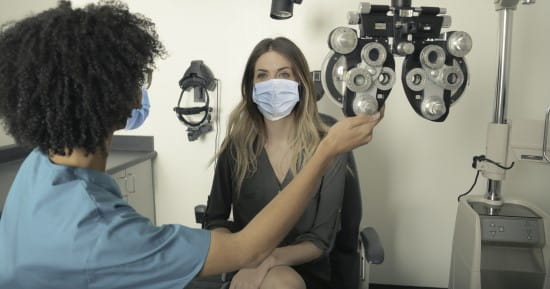
Ophthalmology Residency
Healthy eyes give patients a higher quality of life. Envision your future with a Geisinger Ophthalmology residency.
About us
Benjamin Hale, MD, program director
We designed the Geisinger Ophthalmology Residency with an emphasis on comprehensive ophthalmology education with rotations in the subspecialties of the field. As a resident, you’ll complete all your clinical training at the main campus at Geisinger Medical Center in Danville.
You have your clinic in the same venue as the faculty, which means staff are immediately available for consultation. You’ll enjoy increasing levels of autonomy as your experience and knowledge allows. And you’ll work with each patient on your own before the attending physician helps confirm your findings and diagnostic plan. All faculty and residents draw patients from the same pool of insurers and patient pathology. The program director balances educational and service needs by evaluating rotations and clinical experience.
You and your fellow residents will have multiple levels of supervision, including the subspecialists in the clinic who are available at any time for consultation; the physician on call; and the supervising physician, who is available daily in the clinic for routine questions or other supervisory needs. We find that residents learn best when given the opportunity to examine patients under appropriate supervision with diagnostic tools and subspecialty consultation available.
During their time on call, each staff member’s other clinical duties are scaled back. Patients admitted to the ophthalmology inpatient service are co-managed by the resident and the attending on call at the time of admission, as well as any appropriate specialists. You’ll perform inpatient consultations as a third-year ophthalmology resident. Emergency consultations on inpatients are performed by the resident on call with appropriate staff supervision.
Program strengths include the presence of a full-time attending staff with rapid reliable access to attendings and subspecialists, as well as a faculty-to-resident ratio of 9:6. All subspecialties are represented, which allows you to take advantage of the broad range of pathology available in this general clinic setting. The Department of Ophthalmology has excellent physical facilities with all significant diagnostic and educational technologies, including corneal topography, OCT, HRT, Wavescan and digital photography with a full-time ophthalmic photographer.
The Department of Ophthalmology functions as a large clinic with residents and attending staff drawing from the same patient pool. We make no distinction for “private versus clinic” or insurance type of patients. A staff member is always available for supervision during your one-week on-call period, and all medical staff share this responsibility on a rotating basis.
